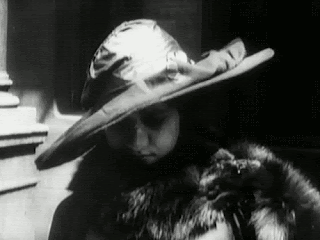Oscar Micheaux's WITHIN OUR GATES (1920)
So... I think I bump this up a point simply for those exquisitely fake-ass right out of Cannibal the Musical Alferd Packer beards slapped on a few of those rabid white antagonists in the latter part of the movie. Maybe that is a term that should come into the fore: Beardface! (Instead of the actually offensive Blackface bullshit). Make all of the try-hard pasty Crackers know that a scraggly dumbass sprayed-on mess of oily stubble is something worth laughing at.
Oh, and the film itself? Still captivating, sobering, sometimes way too pacled with title card and exposition or new characters to follow; but you forgive a lot and not because of the significance as the first distributed feature film by a Black filmmaker in America, rather it's that Micheaux comes with a Full Course Meal (maybe even a menu) of pieces of drama regarding Black (and the Black *female*) subjugation and oppression to show audiences. He starts with education and the movie is like a thematic tree with so much branching off in a short 74 minutes.
I also totally understand now why Spike Lee was/is enamored with Micheaux, more than the historical part of the One Who Started It All of it. The directors both use cinema as a thoroughly modern tool of attack as well as entertainment, a steadfastly and often harrowing Melodramatic kind of storytelling, as a means to make BOLD responses to other films and things in culture - only for Micheaux he is dealing with the fact that White people (even/especially the well meaning ones) couldn't conceive of the idea that Black children should... get an Education. Why do that, it'll just give them... *ideas* after all(!)
So it's really special that this is a response to Birth of a Nation while one can see it as a form of inspiration to other artists as an example of taking a story like how Micheaux just went for it. This doesn't mean Within Our Gates isn't without flaws in the performances or in the writing (that one thief who takes Sylvia's money seems like just as bad a stereotype as would appear in a regulation white directed film). But when the storytelling allows for large personalities to shine with an honesty while at the same time still being *intentionally* entertaining (unlike the horror shor of Griffith), like the big Church set piece where we keep seeing patrons asleep, it's more than a simple History Lesson.
And while certainly the most impactful section is the horrifying back-story of our hero last twenty minutes, with a frame-job murder that leads to a lynching, the power to shock more than a century on is a) because it shows the truth of what white supremacy was then and moreover b) the film has example after example of racism that comes because it is so baked into culture - for whites who know nothing different and have no imagination for anything else, and for (some) blacks who would debase themselves in this system (the "Tattletale") - especially in the South, but in the North as well. For Micheaux to have this in 1920 no less is wildly courageous and his daring is having knives out on all sides, despite the Narrative clumsiness at points (you might even say.... Woke as it really means, but I digress).
I last but not least would like to point out Evelyn Pruel's performance as she is delivering something real and honest, while often in a To the Balcony level of heightened emotions and reactions, like when confronted with bold faced liars and cheats in her quest for money for the poor uneducated children. I might be adrift in an over the top moment or turn, like with the aforementioned ungodly fake beards, but it would come back to her and it would be better.





Comments
Post a Comment